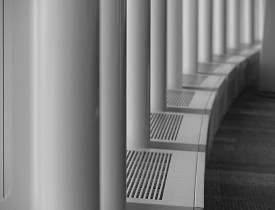Yearly HVAC Filter Changing Schedule
 In the old days, the only filter most folks had to worry about was in their furnace, but now that's changed. In today's airtight and precisely climate-controlled indoor spaces, a home may have a half-dozen or more filters to check, some of them on a year-round basis. At the same time, much more is known about indoor air quality and its health effects, resulting in greater emphasis on clean filters. While it's true that clean air is better for your body, it's also better for your HVAC equipment. Dirty, clogged filters make blowers and other mechanisms work harder, ultimately shortening their life.
In the old days, the only filter most folks had to worry about was in their furnace, but now that's changed. In today's airtight and precisely climate-controlled indoor spaces, a home may have a half-dozen or more filters to check, some of them on a year-round basis. At the same time, much more is known about indoor air quality and its health effects, resulting in greater emphasis on clean filters. While it's true that clean air is better for your body, it's also better for your HVAC equipment. Dirty, clogged filters make blowers and other mechanisms work harder, ultimately shortening their life.
How do you keep track of them all? The best way is to create a simple schedule for the entire year, listing all your home's filters and when to check, clean and/or replace each one. This is also a good place to jot down the filter specs (product number, description, size, etc.) so you'll know exactly what to buy when it's time for replacement. To help get you started on your yearly filter schedule, here's a list of the most common HVAC devices and when their filters should be checked.
Forced-air Furnace
Check the filter monthly during the heating season. If you have central air conditioning, also check the filter each month throughout the cooling season. Replace the filter at the beginning of each heating season (and cooling season, if applicable) and anytime the filter looks dirty during your monthly checks. Hold the filter over a bright light to see how dirty it is. Install filters with the arrows (printed on the filter frame) in the direction of the system's airflow.
Evaporative Cooler
Many newer evaporative coolers (a.k.a. swamp coolers) have air filters that clean the intake air before it gets to the cooling pads. Some also have water filters that remove minerals and sediment from the supply water. As with the cooling pads, filters should be checked, cleaned and/or replaced based on the site conditions and how much the unit is used. With heavy use, check the filters and pads once a month during the cooling season. The same goes for portable indoor units.
Air Conditioner
Conventional central air conditioning systems typically don't have air filters on the AC unit itself. However, many units should have their condenser and evaporator coils cleaned regularly per the manufacturer's directions. As mentioned above, the furnace or other air handler inside the house has a filter that needs a monthly inspection. Window AC units usually have a washable air filter that should be inspected and cleaned at least once a month during the cooling season. Contractor Kevin Stevens of KMS Woodworks explains:, "Running the fans in an open recirculating mode will still cause the filters to 'load' with dust and debris, whether the AC is adding cooling or not. A lot of homes vary in the levels of dust that are present based on traffic patterns, pets, cleaning practices, etc. The real test is to inspect and swap them out based on your particular case."
Ventilation Fans
Range hoods in the kitchen may have one or more filters that help capture grease, vapor and odors. With recirculating (non-ducted) units, the filter is especially important; without it, the hood is just a fan that blows unfiltered cooking exhaust into the room. Some filters are washable and others are simply disposable. The maintenance schedule on filters entirely depends on the type and amount of cooking you do, but inspecting the filters at least every few months is recommended.
Bathroom vent fans typically don't have filters, but it's a good idea to inspect and clean the intake grill and make sure the vent cap on the outside of the house is unobstructed and that the flap works properly, sealing over the duct when the fan unit is off.
Heat Recovery Ventilator (HRV)
HRVs (and ERVs) typically have a filter for both incoming and outgoing air, and these need to be cleaned or replaced regularly. Consult the owner's manual or manufacturer for maintenance schedules.
A Note About Filters
Homeowners have a lot of questions about filters, particularly furnace filters. At the same time, filter manufacturers make numerous claims on their packaging regarding efficiency and longevity, which are misleading and often not verifiable in real-life situations. Some filters are indeed better than others, but not all types are ideal for every furnace. For example, if your furnace is designed (or the blower is set) for a standard filter, you might experience reduced airflow if you switch to a high-efficiency filter. This can also stress the blower motor because it has to work harder to move air through the filter.
If you're having problems with dust and other particles, a better filter probably will help, but make sure you get the right filter for your equipment. Ask your HVAC pro during your next system checkup, or call the furnace manufacturer for recommendations.
Philip Schmidt is a Networx writer.
Updated May 9, 2018.
Looking for a Pro? Call us (866) 441-6648

Heating & cooling Average Costs
HVAC Contractors Experiences

The Power Of Multiple HVAC Estimates

Fast Air Conditioning Repair Helps Us Beat Atlanta’s Summer Heat



